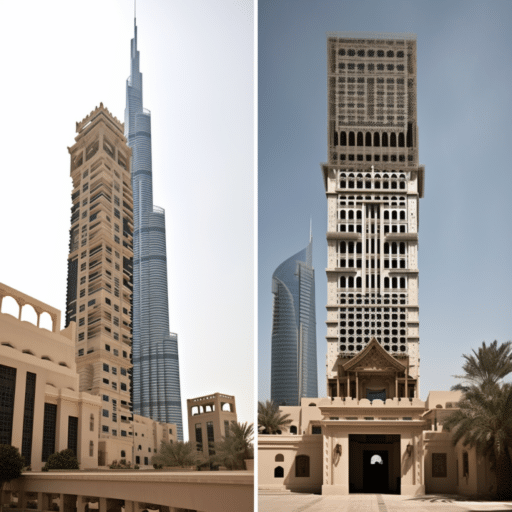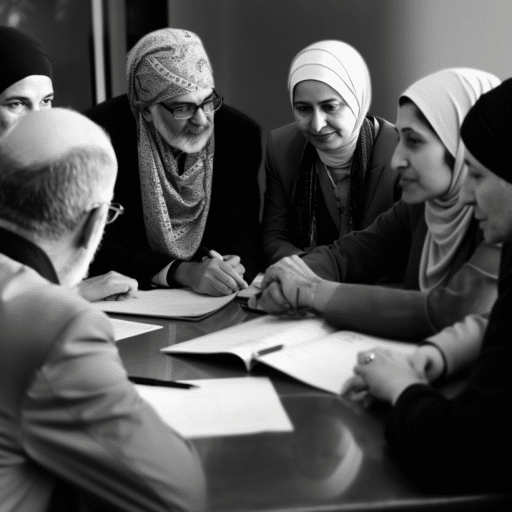Dubai, renowned for its blend of commerce and luxury, magnetically draws expatriates from all corners of the world.
For these non-Muslims, the process and significance of drafting a non-Muslim will in this dynamic city can’t be overstated.
This guide delves deep into the nuances of establishing a non-Muslim will in Dubai, ensuring that your assets seamlessly transition to your chosen beneficiaries.
If you want to invest as an expat or high-net-worth individual, you can email me (advice@adamfayed.com) or use these contact options.
This article isn’t formal legal, or any other, kind of advice, and might not be completely updated. Therefore, this article is for informational purposes only.
If you want formal advice you should contact a law firm or government agencies directly.
Importance of Having a Will in Dubai for Non-Muslims
Crafting a non-Muslim will in Dubai transcends mere paperwork; it’s a testament to foresight and responsibility.
The absence of a non-Muslim will can plunge your assets into a quagmire of legal complexities, jeopardizing your family’s financial future.
Neglecting to draft a non-Muslim will can lead to the unintended distribution of your assets under Dubai’s local laws, which predominantly follow Sharia law.
Such distributions might not mirror the desires and intentions of non-Muslim individuals, leading to potential disputes and heartaches. By drafting a non-Muslim will, you cement the fate of your assets, directing them to your designated beneficiaries.
This proactive step not only fortifies your family’s financial security but also circumvents potential legal skirmishes that can arise in the absence of a clear non-Muslim will.
Understanding Dubai’s Legal Landscape
Dubai’s legal landscape uniquely combines both traditional and modern legal systems.
For non-Muslims, a keen understanding of this landscape becomes essential, especially when drafting a non-Muslim will.

Sharia Law vs. Non-Muslim Wills
Sharia law, deeply rooted in Islamic traditions, serves as the primary inheritance system in Dubai. It dictates the distribution of assets.
However, the emergence of provisions for non-Muslim wills has introduced a transformative shift. Historically, in the absence of a non-Muslim will, the assets of deceased non-Muslims faced distribution according to Sharia principles.
This method often left many expatriates perplexed and unprepared, as it might not align with their personal wishes or the inheritance norms of their home countries.
Dubai’s progressive approach now recognizes non-Muslim wills, granting individuals the choice to sidestep the default system.
This pivotal change ensures that the directives in your non-Muslim will receive both validation and respect.
The Dubai International Financial Centre (DIFC) Wills and Probate Registry
The DIFC stands out as a pivotal institution for non-Muslims eager to draft a will in Dubai. It offers a systematic process, ensuring every non-Muslim will adheres to the highest standards.
The DIFC has established a dedicated registry, known as the “DIFC Wills Registry”, exclusively to address probate-related matters for non-Muslims.
A non-Muslim will registered with the DIFC can encompass assets across all seven Emirates in the UAE. This registration guarantees that the UAE Shariah law won’t influence the distribution of a non-Muslim’s estate.
Types of DIFC Wills
The DIFC, operating under a common law framework, adheres to the principle of testamentary disposition as outlined in the DIFC Wills and Probate Registry Rules.
Upon the issuance of a probate order by the DIFC Court, enforcement across the UAE becomes possible without necessitating further legal proceedings through the UAE local Courts. The DIFC Wills Registry provides five distinct types of Wills for non-Muslims:
- DIFC Full Will
- DIFC Financial Assets Will
- DIFC Guardianship Will
- DIFC Property Will
- DIFC Business Owners Will
Each type caters to specific needs, ensuring that non-Muslims can draft a will that aligns perfectly with their requirements.
For non-Muslim expatriates, the DIFC offers a golden opportunity to safeguard their valuable assets in the UAE.
It eliminates potential interventions by other parties and ensures the Testator’s peace of mind, knowing their assets and loved ones remain protected for the future.
Requirements for a DIFC Will
To draft a non-Muslim will under the DIFC:
- The Testator must be a non-Muslim.
- All involved parties, including the Testator, Executors, Trustees, and Witnesses, must be of legal age as per UAE laws, which is 21 years or older.
By understanding and leveraging the provisions available in Dubai’s legal landscape, non-Muslims can ensure their assets and wishes are honored, providing a secure future for their loved ones.

Step-by-Step Guide to Drafting a Non-Muslim Will
Creating a non-Muslim will in Dubai ensures that your assets and wishes are respected and followed. With the right guidance, the process becomes clear and manageable. Let’s delve into the specifics.
Step 1: Determining the Assets
Every asset you own in Dubai should be part of your non-Muslim will. This comprehensive approach ensures that nothing gets overlooked.
Dubai’s real estate market is booming, and many non-Muslims invest in properties here. When listing your properties in your non-Muslim will, ensure that you possess clear titles and all necessary ownership documents.
Being a financial hub, the country offers a plethora of investment opportunities. Detail all your financial assets, including every bank account, stock, bond, or other investment.
This clarity in your non-Muslim will ensures that every asset finds its rightful beneficiary. Dubai is synonymous with luxury.
From exquisite jewelry pieces to rare art collections, ensure you include all valuable items in your non-Muslim will.
Step 2: Choosing the Beneficiaries
Deciding who inherits your assets is a crucial aspect of your non-Muslim will. Your non-Muslim will should prioritize your immediate family – your spouse, children, and other close relatives. Clearly specify the allocations for each.
If you have assets earmarked for friends or extended family, your non-Muslim will should state this explicitly. Dubai is home to numerous charitable organizations.
If you’re inclined to leave a legacy by donating to a charity, ensure your non-Muslim will reflects this wish.
Step 3: Appointing Executors and Guardians
A non-Muslim will also define the individuals responsible for ensuring your wishes are carried out. Executors play a pivotal role in ensuring the directives of your non-Muslim will are followed.
Meanwhile, guardians are entrusted with the care of any minors until they reach adulthood. When appointing roles in your non-Muslim will, prioritize trust.
Choose individuals who resonate with your values and have a track record of responsibility.
Step 4: Drafting the Will with Legal Assistance
Dubai’s legal landscape can be intricate. While you might consider drafting your non-Muslim will independently, professional legal counsel can be invaluable.
Dubai houses many legal experts experienced in drafting non-Muslim wills. Engaging one ensures that your will stands robust against any legal scrutiny.
Your lawyer will advise on essential clauses that fortify your non-Muslim will, safeguarding your assets and beneficiaries.
Step 5: Registering the Will
Post-drafting, it’s imperative to register your non-Muslim will with the DIFC. The DIFC provides a streamlined process for registering non-Muslim wills.
Your lawyer can guide you through this process and apprise you of the associated fees. Assets and relationships evolve. Consequently, regularly update your non-Muslim will to mirror these changes.
Step 6: Storing the Will Safely
Post-registration, safeguard your non-Muslim will. Bank lockers or secure home safes are ideal storage solutions.
Additionally, inform a trusted individual about its location. Your executor, being a pivotal figure in the execution of your non-Muslim will, should know its storage location.

Step 7: Regularly Reviewing and Updating the Will
A non-Muslim will is dynamic, reflecting the ebb and flow of life. Life events, be it the joy of birth or the sorrow of death, necessitate updates to your non-Muslim will.
Should changes be required, re-engage with your lawyer to ensure that your non-Muslim will remains up-to-date and legally sound.
Common Mistakes to Avoid
Crafting a non-Muslim will in Dubai requires precision, understanding, and attention to detail.
While the intention behind creating a non-Muslim will is to ensure the rightful distribution of assets, certain oversights can jeopardize this objective.
Here are some common pitfalls to watch out for and how to sidestep them.
Overlooking minor assets
Every possession, regardless of its size or value, holds significance. When drafting a non-Muslim will, it’s easy to focus on major assets like properties or significant bank balances.
However, smaller assets, which might hold sentimental value or even considerable monetary value over time, often get overlooked.
The risk of incomplete asset listing
An incomplete list can lead to disputes among beneficiaries. For instance, a piece of jewelry or a cherished family heirloom, if not mentioned in the non-Muslim will, can become a bone of contention.
Maintain a comprehensive inventory of all your assets. Regularly update this list and ensure its reflection in your non-Muslim will.
Not updating the will after major life events
Life is unpredictable. Major events such as marriages, births, divorces, or even significant financial changes necessitate updates in your non-Muslim will.
An outdated non-Muslim will might not represent your current wishes. This oversight can lead to unintended beneficiaries or exclude deserving ones. Make it a practice to review your non-Muslim will annually.
Additionally, after any significant life event, consult with your legal advisor to make necessary amendments to your non-Muslim will.
Failing to consider potential legal changes in Dubai
Dubai’s legal environment, especially concerning non-Muslim wills, is dynamic. Laws and regulations evolve, and your non-Muslim will should adapt accordingly.
A non-Muslim will that doesn’t align with the latest legal stipulations might face challenges during execution. For instance, the UAE courts, in the absence of a valid non-Muslim will, adhere to Sharia law for asset distribution.
Stay informed about the latest legal changes concerning non-Muslim wills in Dubai. Engage with a licensed and registered lawyer who specializes in non-Muslim wills.
Such professionals remain updated with the latest legal changes and can guide you accordingly.
The importance of professional guidance
Due to the risks associated with homemade wills or those prepared by unlicensed writers, such wills often contain mistakes or lack essential clauses, leading to them being deemed invalid in the UAE.
It is recommended to engage a licensed and registered lawyer to draft a non-Muslim will, as the estate administration process in Dubai differs from other jurisdictions.
The Role of Witnesses in Authenticating a Non-Muslim Will
Witnesses play a pivotal role in the authentication of a non-Muslim will in Dubai. Their presence and signatures lend credibility and legal strength to the document.
Witnesses validate the authenticity of a non-Muslim will. Their testimony confirms that the Testator willingly and soundly made the decisions outlined in the will.

Ensure you choose individuals of sound mind, of legal age, and who aren’t beneficiaries of the will. When drafting a non-Muslim will, the presence of credible witnesses becomes indispensable.
They act as the backbone, ensuring that the will stands strong in the face of scrutiny.
Potential Consequences of Not Having Witnesses
A non-Muslim will without credible witnesses may face challenges during execution. The absence of witnesses can raise doubts about the will’s authenticity, leading to potential legal disputes.
In Dubai, where the legal landscape is ever-evolving, the importance of having a non-Muslim will backed by trustworthy witnesses cannot be stressed enough.
It’s not just about ticking a box; it’s about ensuring your last wishes are respected and executed without hurdles.
Choosing the Right Witnesses for Your Will
Selecting the right witnesses for your non-Muslim will is crucial. Choose individuals who understand the gravity of their role.
They should be available, if needed, to testify about the will’s signing process and the Testator’s state of mind. It’s not just about having any witnesses; it’s about having the right ones.
Their role goes beyond just signing a document; they might be called upon to vouch for the will’s authenticity and the Testator’s intentions.
Cultural Sensitivities and Their Impact on Non-Muslim Wills in Dubai
Dubai, a melting pot of cultures, traditions, and beliefs, offers a unique challenge when drafting a non-Muslim will.
The city’s rich tapestry of residents from all corners of the globe means that a non-Muslim will must cater to a diverse set of expectations and norms.
Recognizing and addressing these cultural sensitivities ensures that your non-Muslim will stands robust and uncontested.
Recognizing Cultural Differences in Asset Distribution
Every culture carries its own set of beliefs and norms regarding asset distribution after one’s demise. For instance, in some cultures, it’s customary to leave a larger portion of assets to the eldest son, while in others, assets get divided equally among all children.
When you draft a non-Muslim will in Dubai, it becomes crucial to understand these cultural nuances. Before finalizing your non-Muslim will, research the cultural norms of your community or consult community leaders.
This proactive approach ensures that your non-Muslim will aligns with both your wishes and cultural expectations. While your non-Muslim will should reflect your personal wishes, consider leaving some flexibility in asset distribution.
This approach can cater to unforeseen cultural obligations or expectations.
Balancing Personal Wishes with Cultural Expectations
Striking a balance between personal desires and cultural norms can be challenging. However, this balance ensures that beneficiaries respect and understand the decisions outlined in your non-Muslim will.
Discuss your intentions with your family and beneficiaries. Open dialogue can address potential cultural concerns and ensure everyone understands the rationale behind your non-Muslim will’s stipulations.
In cases of potential conflict between personal wishes and cultural expectations, consider professional mediation. A mediator can help navigate these complexities, ensuring that your non-Muslim will remains fair and balanced.
Potential Cultural Conflicts in Will Execution
Anticipating cultural conflicts and addressing them in your non-Muslim will is essential. This foresight minimizes disputes and ensures smooth will execution.

Ensure that your non-Muslim will uses clear and unambiguous language. This clarity minimizes potential misinterpretations arising from cultural differences. If certain decisions in your non-Muslim will might raise eyebrows due to cultural norms, consider adding explanations.
These insights offer beneficiaries a window into your thought process, fostering understanding and respect.
Pained by financial indecision? Want to invest with Adam?

Adam is an internationally recognised author on financial matters with over 827million answer views on Quora, a widely sold book on Amazon, and a contributor on Forbes.



